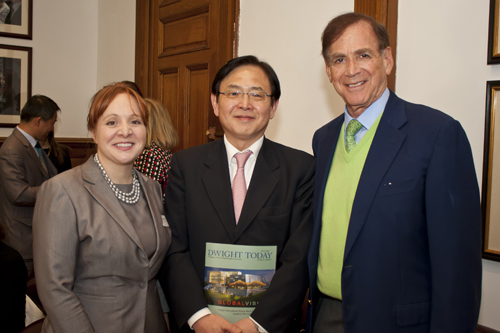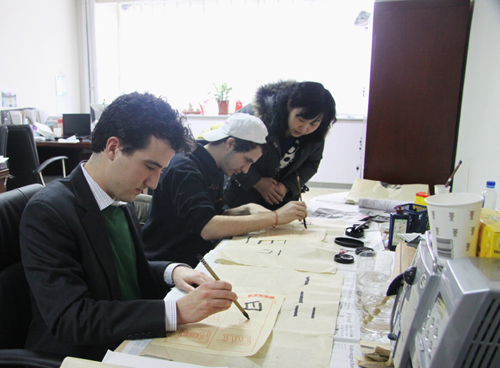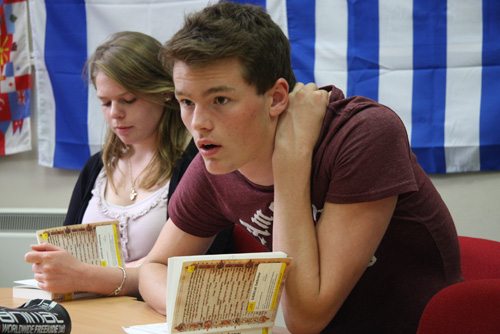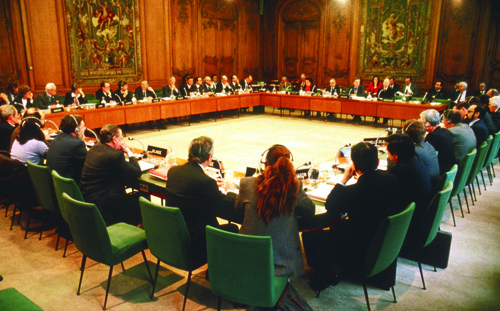
The first IB “through school” (primary years, middle years and diploma program) will open its doors to students in one of the world’s leading education systems in August 2012 — Seoul, South Korea. The school is located in Seoul’s new Digital Media City, considered Korea’s Silicon Valley.
Founded in 1968, the IB currently works with 3,371 schools in 141 countries. Dr. Siva Kumari, Chief Operating Officer of the IBO Schools Division explains:
“The IB has integrally believed in creating an intellectually challenging but age-appropriate program of study for students. Internationalism and inclusion are part of our DNA, both as an organization and within our curriculum. To understand others, the students must understand their own culture and respect their own language, as well as develop a deep understanding that knowledge and knowing are dependent on perspectives. Alongside intellectually rigorous academics, we feel the need to develop students who are open-minded, caring and principled, and that can effectively function anywhere in the world. We value innovation both in our curriculum and among our students. Our curriculum is co-created with IB teachers from all around the world. We gather their best ideas and germinate those via pilots in other schools; best practices are then circulated to our schools worldwide. We also create a framework where students’ innovative spirits are fostered, given room to grow and are mentored within guidelines. At all levels, we allow students to exhibit their own individualized investigation of a topic that they are deeply curious about.”

The Dwight Family of Schools, headed by Chancellor Stephen Spahn, was selected by the Seoul Metropolitan Government after viewing 100 schools for the project because of its outstanding IB curriculum, as well as Dwight’s leadership in international education.
To find out more about how a leading global education system and a celebrated 140 year old family of IB schools plan to marry their models, I chatted with Head of School in Seoul, Kevin Skeoch:
Apart from being the first IB “through school,” why is the Dwight school in Seoul different from other international schools available?
There are a number of reasons. Dwight Seoul stresses innovation and leadership at its center. It is a continuum of education in the best practices of teaching and learning that follows a tested Dwight Family of Schools model of IB education already working in four IB World Schools on three continents. Dwight Seoul is a non-denominational school that believes there is a “spark of genius” in every child. Its teachers come from a network of experienced IB professionals who know what it means to educate internationally. Dwight Seoul will be an innovative flagship IB school specializing in technology.

Can you speak about your technology focus in Korea and how you envision this will evolve?
If a student wants to know something today, they automatically turn to one of several electronic devices; that’s their dictionary. That in itself represents a major paradigm shift from the way those over 30 were taught. But no school can keep up with technology today. Dwight Seoul is a BYOD (bring your own device) school for grades 6 through 12 and operates on a one to one supported technology framework. Whether a laptop, IPad, tab or something else, your piece of technology is an extension of you in school. Technology is not the answer, but the tool to support you in your search for knowledge and understanding. We will be supplying devices on a 1:3 ratio up to Grade 3, and 1:2 in Grades 4 – 5. We will also have two fully equipped iMac labs. What we want from technology is the ability to turn the classroom into a more collaborative learning experience. When you enter the Dwight school in Seoul, the first visual should be students working together in small groups.
We are taking a very progressive approach to incorporating technology in the classrooms: making all our lessons available in an online learning system, which would be made available to students to use wherever they are. In the classroom, this translates into students being able to replay a lesson in their own time if at first they don’t understand. The individualized approach to learning enables students to review the day’s learning at their own pace in their own environment.
LCD television screens are provided for teachers and students to present multimedia applications in all classrooms. Full wireless access is provided to enable everyone to access our catalogue of online resources for individual and collaborative learning. Students can access the resources at home and in school. In the library and resource center and central foyers, live feeds will present events of the day, news feeds, etc. throughout the school.
Dwight Seoul is taking an approach to online learning environments that will not only bring all Dwight students together (not limited by location) but also network students around the world. Collaborative learning happens by default and together with our virtual classroom. Talking to one another and learning across continents will enhance this online environment even further.
We’re also looking at ways to use technology to educate teachers. The interest in IB in Korea, other parts of Asia, and indeed other underdeveloped countries is huge, but it comes down to basic teacher training. How you change teachers from rote learning styles to the IB style of learning is the challenge for the future. We have built a teacher training center at the Seoul school along with the appropriate technology for teachers to do this.

Stressed out South Korean students have received significant media attention in the US. Thoughts on stress created by SAT tests and other assessments, including the IB?
Dwight Seoul is about creating real leaders and not just test takers. The SAT in a school like ours is less important than creating a well-rounded individual who is able to rise above exams. We will have a clear roadmap for how students prepare for their IB exams, and the SAT is a part of that preparation for university. The worst schools I have visited are those that dump the tests on kids at the end of grade 10 and it just becomes too much for them to handle on top of all the other internal assessments as well as the diploma exams. Koreans are known for their testing performance and they probably work themselves to the bone to make sure they do well on standardized tests. However, parents applying to our school have told me they want to get their kids out of that traditional testing environment. They want a more progressive school that maps students’ testing on a continuum of learning and is more geared towards what is required for their children to compete globally. Dwight Seoul students will take the SAT test if they intend to apply to US colleges where the SAT is required, but the SAT will not be the main focus of their education. The majority of the focus will be on the IB and supporting individualized journeys to discovering each child’s spark of genius.
Have students completing the IB diploma in the US, UK, Canada, China or South Korea been prepared for universities anywhere in the world?
The IB is not only the preferred international school curriculum today, it is also highly regarded by over 4000 universities around the world who accept the diploma as an entrance requirement. Students who receive an IB diploma are prepared to go on to universities anywhere in the world. A child who is going to university in the UK, Australia, Switzerland or the US will have different requirements to meet depending on their course of study and the type of university they are applying to. A recent poll of top UK universities indicated the IB middle years program is a good preparation for the diploma program, which was preferred by 80% of universities polled. With an IB education, students develop a breadth and depth of knowledge, they are known to stay the course and not drop out of university, they approach knowledge with alternative views, share a deeper understanding of critical thinking and research, and they know how to work under stress.
For more information: http://www.dwight.or.kr/

Photos courtesy of Ian Wilson and the Dwight School.
In The Global Search for Education, join me and globally renowned thought leaders including Sir Michael Barber (UK), Dr. Michael Block (US), Dr. Leon Botstein (US), Dr. Linda Darling-Hammond (US), Dr. Madhav Chavan (India), Professor Michael Fullan (Canada), Professor Howard Gardner (US), Professor Yvonne Hellman (The Netherlands), Professor Kristin Helstad (Norway), Jean Hendrickson (US), Professor Rose Hipkins (New Zealand), Professor Cornelia Hoogland (Canada), Mme. Chantal Kaufmann (Belgium), Dr. Eija Kauppinen (Finland), State Secretary Tapio Kosunen (Finland), Professor Dominique Lafontaine (Belgium), Professor Hugh Lauder (UK), Professor Ben Levin (Canada), Professor Barry McGaw (Australia), Shiv Nadar (India), Professor R. Natarajan (India), Dr. Denise Pope (US), Sridhar Rajagopalan (India), Dr. Diane Ravitch (US), Sir Ken Robinson (UK), Professor Pasi Sahlberg (Finland), Andreas Schleicher (PISA, OECD), Dr. Anthony Seldon (UK), Dr. David Shaffer (US), Dr. Kirsten Sivesind (Norway), Chancellor Stephen Spahn (US), Yves Theze (Lycee Francais US), Professor Charles Ungerleider (Canada), Professor Tony Wagner (US), Sir David Watson (UK), Professor Dylan Wiliam (UK), Dr. Mark Wormald (UK), Professor Theo Wubbels (The Netherlands), Professor Michael Young (UK), and Professor Minxuan Zhang (China) as they explore the big picture education questions that all nations face today. The Global Search for Education Community Page
C. M. Rubin is the author of two widely read online series for which she received a 2011 Upton Sinclair award, “The Global Search for Education” and “How Will We Read?” She is also the author of three bestselling books, including The Real Alice in Wonderland.






Recent Comments